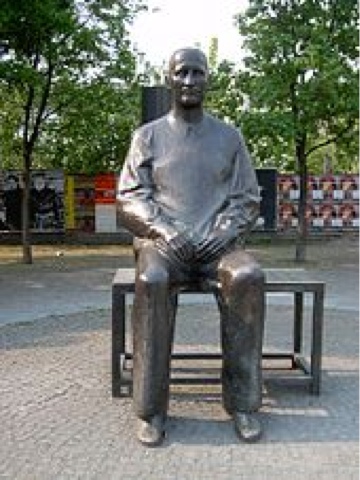I had the unique opportunity yesterday to be in the audience for a filming of the Royal Winnipeg Ballet's acclaimed Moulin Rouge, choreographed by Jordan Morris. The project will be broadcast to cineplex theatres around the world, and is a really monumental occasion for the nearly 75 year old company, home to many brilliant dancers.
What was really exciting for me was the process; having trained in dance myself, I am most engaged with the work of the dancer, and the effort made to make it appear effortless. Due to filming, the ballet was shot out of sequence (as it is easier to situate cameras and costumes for filming this way) which had an unusual effect. What it brought out was a reminder of the work that goes into performing a ballet of this magnitude. Occasionally while waiting for technical setup, the dancers would wait on stage, stretching or reviewing their choreography - things that always happen, but typically are hidden from the audience to maintain the illusion of perfection. As well, the movement of sets and testing of lights throughout was unintentionally performative, and highly engaging.
It was just as much an experience of dance performance as it was an experience of the structure and production of dance performance - something ballet of all modern art forms has the tendency to hide. The result was the most Brechtian dance performance you could imagine. Verfremmdungseffekt is generally the antithesis of classical ballet - whose very aim is to transport you along with the story - however in this instance the distancing, the objective observation of the behaviour, was truly possible. A moment when Zeigler pulls a pistol on the young lovers, then proceeds with a dance of seductive pas de deux with Natalie, gun still in hand, was haunting in a way it couldn't have been had we been caught up in her story. As well, the masochism of ballet rang loud and clear (perhaps ironically for a company which recently dismissed a student for appearance in a porn) with the fact that the goal of all female characters was valuation and redemption in the eyes of a male character.
I'm very excited to see the piece "Put together" as it were, in the intended order, as it will be a very different experience of the ballet.
What was really exciting for me was the process; having trained in dance myself, I am most engaged with the work of the dancer, and the effort made to make it appear effortless. Due to filming, the ballet was shot out of sequence (as it is easier to situate cameras and costumes for filming this way) which had an unusual effect. What it brought out was a reminder of the work that goes into performing a ballet of this magnitude. Occasionally while waiting for technical setup, the dancers would wait on stage, stretching or reviewing their choreography - things that always happen, but typically are hidden from the audience to maintain the illusion of perfection. As well, the movement of sets and testing of lights throughout was unintentionally performative, and highly engaging.
It was just as much an experience of dance performance as it was an experience of the structure and production of dance performance - something ballet of all modern art forms has the tendency to hide. The result was the most Brechtian dance performance you could imagine. Verfremmdungseffekt is generally the antithesis of classical ballet - whose very aim is to transport you along with the story - however in this instance the distancing, the objective observation of the behaviour, was truly possible. A moment when Zeigler pulls a pistol on the young lovers, then proceeds with a dance of seductive pas de deux with Natalie, gun still in hand, was haunting in a way it couldn't have been had we been caught up in her story. As well, the masochism of ballet rang loud and clear (perhaps ironically for a company which recently dismissed a student for appearance in a porn) with the fact that the goal of all female characters was valuation and redemption in the eyes of a male character.
I'm very excited to see the piece "Put together" as it were, in the intended order, as it will be a very different experience of the ballet.


